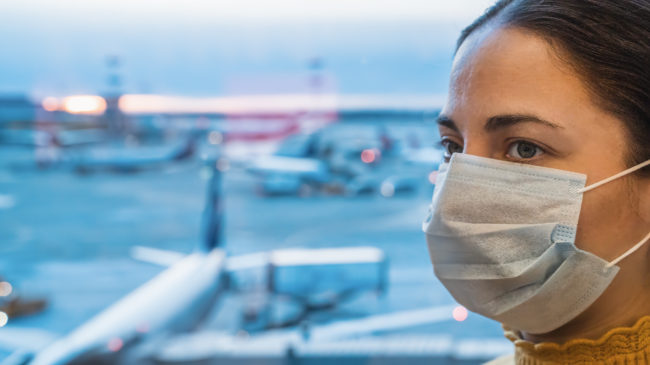In recent weeks, an idea has been floated that the Federal Aviation Administration (FAA) should impose a mask-wearing requirement on all U.S. airline passengers. This call has come primarily from airline employee unions, along with their allies in Congress. U.S. carriers and the FAA have so far resisted a passenger-masking mandate, although airlines are increasingly imposing their own passenger mask policies. Universal mask-wearing may be a wise protective measure. But the question of whether or not the FAA should promulgate a mask mandate has overshadowed another important question: Does the FAA have the authority to require passengers to wear masks in the first place?
The final answer would rest with the courts, but the balance of evidence suggests the FAA does not possess the clear power to issue and enforce a mask rule.
As of this writing, several U.S. carriers have voluntarily imposed masking requirements on their customers. Jet Blue was first to require passengers to wear masks “throughout their journey, including during check-in, boarding, while in flight and deplaning,” beginning May 4. Delta and United will follow suit beginning on May 4. Mandatory mask policies go into effect on May 8 for Frontier and May 11 for American Airlines.
Looking to the East Asian carriers, who are both beginning to restart more frequent operations and have more experience with viral pandemics, Korean Air imposes a passenger mask requirement in addition to thermal screening during the boarding process at Seoul’s Incheon International Airport, where passengers with body temperatures greater than 99.5 degrees Fahrenheit will be denied boarding.
In response to an order from the Ministry of Land, Infrastructure, and Transport, Japan’s All Nippon Airways has instituted thermal screening at Tokyo’s Haneda Airport but has not yet imposed a passenger mask requirement.
While the International Air Transport Association still does not recommend universal passenger masking, U.S. and European carriers are likely to watch their Asian counterparts closely for guidance as they attempt to launch their “new normal” operations.
How to safely proceed in this uncertain time on is everyone’s mind—airlines, employees, and regulators, alike. That being said, the growing chorus among carrier unions and some politicians for an FAA mask mandate is not well-grounded in the law, and imposing such a regulation risks creating collateral policy damage.
The FAA, as an aviation safety regulator, does not possess general public health expertise or police powers. Proponents of an FAA mask mandate cite a 2006 Federal Register notice in which the FAA declared itself to be a “public health authority.” But what the FAA mask mandate proponents miss is the context of this notice.
The 2006 FAA notice was in response to a 2000 Department of Health and Human Services privacy rule under the Health Insurance Portability and Accountability Act of 1996 (HIPPA). In a nutshell, the FAA’s 2006 notice was a necessary step to comply with HIPPA privacy regulations in order to ensure the FAA’s Federal Air Surgeon and Civil Aerospace Medical Institute would maintain access to adequate and accurate health data for research purposes. It had nothing to do with the exercise of broad public health police powers, which in any event are generally state, not federal, functions. Proponents tellingly do not point to any specific federal statute, regulation, or court ruling supporting the conclusion that the FAA does possess these powers. That’s because there are none.
Interestingly, while the FAA lacks the clear statutory authority to impose a passenger masking mandate, the Department of Transportation’s Office of the Secretary of Transportation may have such power. Specifically, Section 41702 of Title 49 of the U.S. Code requires that “[a]n air carrier shall provide safe and adequate interstate air transportation.” This seemingly nebulous authority was narrowed by a series of court cases when the Civil Aeronautics Board was the entity wielding it, but if DOT’s Office of the Secretary could present more-than-theoretical evidence that a mask mandate would materially enhance passenger and crew safety, it would likely get the green light from the judiciary. Indeed, if such a finding was made, the regulation could be brought immediately into force without the usual notice-and-comment procedural protections and niceties of the Administrative Procedure Act under the APA’s “good cause” exception. This suggests at a minimum that mask mandate proponents are barking up the wrong tree.
But should the Office of the Secretary of Transportation promulgate a mandatory passenger mask regulation?
Given the rapid evolution in carrier attitudes toward masks during the last week and assuming universal masking is sound policy, locking in a hard rule may be at best unnecessary and at worst could prevent the rapid response to new information on COVID-19 that is critical to mitigating the pandemic’s worst impacts. The dangers of regulators expanding their power into areas in which they are not expert should also concern policymakers.

